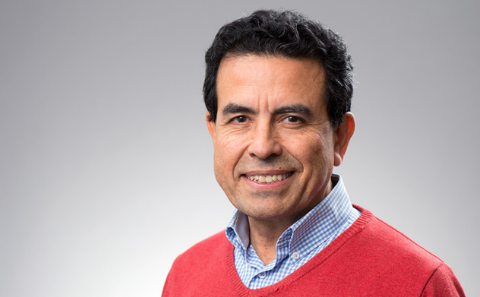ROMERO Lab
- : -
Pr Pedro Romero retired in August 2021 and was made Honorary professor of the University of Lausanne. In September 2021, Pr Romero was appointed Deputy scientific managing director of the Lausanne Branch of the Ludwig Institute for Cancer Research.
- : -
Focus of Romero Lab
Our research activities focus on tumor immunology and immunotherapy of cancer and have both a translational vocation and a strong focus on the biology and dynamics of cytolytic CD8 T lymphocyte (CTL) responses.
Projects of Romero Lab
Molecular mechanisms underlying CD8 T cell differentiation in infection and cancer
We are interested in understanding the molecular pathways involved in imparting effector T cell differentiation or memory T cell formation in the course of adaptive immune responses to tumors or to microbial infections. In this context, we study the role of certain microRNAs with particular focus on miR-155. We are also interested in understanding the role of mTOR signaling in regulating immune cell metabolic processes underlying lymphocyte activation and differentiation. We currently focus on the role of mTORC2 in differentiation of CD8 T lymphocytes and found that the conditional deletion of Rictor leads to increased memory T cell generation in the course of antigen-specific CD8 T cell responses.
Together with intramural collaborators as well as groups in Zurich (C Münz, UHZ) and Munich (D Zehn, TUM), we explore the molecular events underlying the phenotypic and functional adaptation of T cells exposed to chronic antigen stimulation during chronic microbial infection and upon tumor progression. We also strive to figure out the links between effector, memory and “exhausted” stages of T cell differentiation. New molecules, discrete signaling modules and epigenetic regulators are targeted for the development of innovative therapies.
Preclinical testing of cancer vaccines
Because therapeutic cancer vaccines need optimization, the use of pre-clinical tumor models is helpful to rapidly testing a relatively large number of variables such as antigens, adjuvants, route of delivery, dose, sequence of administration and so on. In addition to the syngeneic transplantable tumor models, humanized models are also very useful. We use HLA-A2 tetramers to monitor the anti-peptide CTL response to vaccination in mouse blood, lymph nodes and spleen. Using this system we observed that a combination of incomplete Freund's adjuvant and synthetic oligodeoxynucleotides containing CpG motifs synergize in the induction of a strong Melan-A/MART-1 peptide specific CTL response. We are currently focusing on the role of various TLR agonists in modulating the strength and the quality of the elicited T cell response. Their ability to target cross presenting dendritic cells is analyzed using transgenic and knock out mouse strains. To model the improvement of anti-tumor clinical efficacy of subunit vaccines, we are also interested in combinations of synthetic vaccines with immune checkpoint blockade, immunomodulatory compounds, chemotherapy and/or radiotherapy. We take a multidisciplinary approach through cooperation with specialized translational research groups on site at the Department of Fundamental Oncology, Ludwig Cancer Research Center.
Harnessing NKT cells for cancer immunotherapy
Invariant Natural Killer T (iNKT) cells are potent transactivators of the innate and adaptive immune responses, and there is a great interest to include them in tumor vaccine settings. Soluble constructs of CD1d presenting the superagonist alpha-galactosyl-ceramide (a-GalCer) have been developed in the group (A. Donda, J-P Mach), and represent promising agents to activate iNKT cells in vivo with minimal subsequent anergy. Importantly, these recombinant molecules are targeted to the tumor site by their fusion to scFv fragments from selected antibodies such as anti-CEA and anti-HER-2, which promote a strong innate and adaptive immune response at the tumor site.
Adoptive T cell transfer therapy of cancer
Experimental evidence in mouse models show potent anti-tumor activity of adoptively transferred CTL. Recent trials have also shown that antigen-specific CD8 T cells can be safely transferred in humans but clinical efficacy remains limited. We are optimizing in vitro expansion protocols and conducting a detailed study of the role of TCR affinity and T cell functional avidity in the outcome of both the priming of de novo tumor antigen specific T cell responses or the therapeutic anti-tumor activity of tumor infiltrating antigen specific T cells. The role of concomitant immune checkpoint blockade intervention and adoptive transfer therapy is also explored in well-defined mouse models. We also assess the feasibility and the potential benefit of transducing antigen-specific T cells for adoptive transfer therapy with chimeric antigen receptors (CARs), and we carry a careful study of the signaling pathways when both receptors, TCR and CAR, are simultaneously engaged. This doubly antigen specific T cells may be more potent and offer opportunities for immunomodulation as part of the therapeutic intervention.
Monitoring antigen-specific CTL and helper T cell responses and phase I clinical trials of peptide vaccination in melanoma
We routinely use the fluorescent tetramer technology to visualize antigen-specific T cells directly by flow cytometry. We have enumerated and functionally characterized single tumor antigen specific T cells in blood, metastatic nodes and tumor masses from patients with metastatic melanoma as well as in blood from healthy individuals. We identified a particularly abundant T cell repertoire specific for the HLA-A2/Melan-A/MART-1 antigen, expressed in normal melanocytes and melanoma cells. Quantitative monitoring of vaccine-induced tumor-specific CTL responses is a major focus in our vaccination program. In collaboration with Daniel E. Speiser and clinicians at the Department of Oncology, University Hospital of Lausanne (CHUV), we design and perform clinical trials in appropriately selected patients with metastatic melanoma, as well as in other tumor types such as head and neck cancer, prostate and bladder carcinomas. We are participating to several FP7 EU consortia projects with the mission to develop and harmonize tools for optimal monitoring of immune cell populations in the blood and within the tumor microenvironment in patients before and after treatment. These efforts might unveil prognostic or predictive markers for clinical efficacy and safety.
KEY PUBLICATIONS

- Local T-cell to MDSC balance following BCG immunotherapy is modulated by group-2 innate lymphoid cells and predictive of bladder cancer recurrence.
- Vaccination of stage III and IV melanoma patients with long NY-ESO peptide and CpG-B elicits robust CD8 and CD4 T-cell responses with multiple specificities including a novel DR7 restricted epitope. Oncoimmunology (2016)
- Mammalian target of rapamycin complex 2 controls CD8 T cell memory differentiation in a Foxo1-dependent manner. Cell Rep. (2016)
|
Affiliations |
|
|
Links |
|




